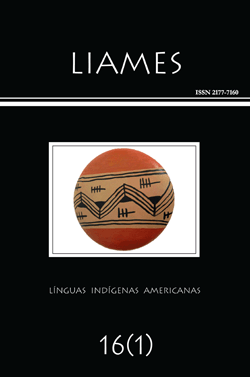Resumo
Aunque la cortesía lingüística ha sido un tema de investigación desde hace varios años, todavía existen muchos idiomas que han sido escasamente considerados en esos estudios; uno de ellos es el purépecha, lengua mesoamericana aislada que aún se habla en México por más de 124,000 personas. Dado que los hablantes de diferentes idiomas poseen distintos medios para expresar la cortesía, es crucial investigar las estrategias específicas de cortesía de los hablantes de distintas lenguas y así acrecentar nuestro conocimiento de las funciones sociales del lenguaje. Así, este trabajo representa un estudio de las principales estrategias de cortesía en purépecha, comparándolas con estrategias similares del español; por ejemplo, el uso de pronombres de respeto, de enclíticos pronominales, y de tiempos verbales como el futuro y el condicional. Además, la comparación de estos dos idiomas tan distantes tipológicamente puede contribuir a esclarecer la posible universalidad de teorías relacionadas a la cortesía lingüística.
Referências
BASALENQUE, Diego (1962 [1714]). Arte de la lengua tarasca. Morelia, Mexico: Universidad Michoacana de San Nicolás de Hidalgo.
BROWN, Penelope; LEVINSON, Stephen (1978). Universals in language usage: Politeness phenomena. In Esther N. Goody (ed.). Questions and Politeness, pp. 56-289. Cambridge: Cambridge University Press.
BROWN, Penelope; LEVINSON, Stephen (1987). Politeness: Some universals in language usage. Cambridge: Cambridge University Press.
CAMPBELL, Lyle; Kaufman, Terrence; Smith-Stark, Thomas C. (1986). Meso-America as a linguistic area. Language 62(3): 530-570.
CHAMOREAU, Claudine (2003). Grammaire du purépecha. Muenchen, Germany: Lincom Europa.
CHODOROWSKA-PILCH, Marianna (2004). The conditional: A grammaticalised marker of politeness in Spanish. In Rosina Márquez Reiter; María Elena Placencia (eds.). Current Trends in the Pragmatics of Spanish, pp. 57-75. Amsterdam: John Benjamins.
EVANS, Nicholas (2010). Dying words. Endangered languages and what they have to tell us. Malden, MA: Wiley-Blackwell.
FLEISCHMANN, Suzanne (1989). Temporal distance. Studies in Language 13(1): 1-51.
FOSTER, Mary L. (1969). The Tarascan language. Berkeley: University of California Press.
FRASER, Bruce (2005). Whither politeness. In Robin T. Lakoff; Sachiko Ide (eds.). Broadening the horizon of linguistic politeness, pp. 65-83. Amsterdam: John Benjamins.
FRIEDRICH, Paul (1971). The Tarascan suffixes of locative space: Meaning and morphotactics. Bloomington: Indiana University Publications.
GILBERTI, Maturino (1987 [1558]). Arte de la lengua de Michuacan. Morelia, Mexico: Fimax Publicistas Editores.
HAVERKATE, Henk (1990). Politeness and mitigation in Spanish: A morpho-pragmatic analysis. In Harm Pinkster; Inge Genee (eds.). Unity in diversity: Papers presented to Simon C. Dik on his 50th birthday, pp. 107-131. Dordrecht, The Netherlands: Foris Publications.
HILL, Jane H.; HILL, Kenneth C. (1978). Honorific usage in Modern Nahuatl: The expression of social distance and respect in the Nahuatl of the Malinche Volcano area. Language 54(1): 123-155.
IDE, Sachiko (1989). Formal forms and discernment: Two neglected aspects of universals of linguistic politeness. Multilingua 8(2): 223-248.
INALI (2010). Catálogo de las Lenguas Indígenas Nacionales. Variantes lingüísticas de México con sus autodenominaciones y referencias geoestadísticas. Available at: http://www.inali.gob.mx/clin-inali/#agr Date of access: 10-04-2015.
INEGI (n.d.). Lenguas indígenas en México y hablantes (de 5 años y más) al 2010. Available at: http://cuentame.inegi.org.mx/hipertexto/todas_lenguas.htm Date of access: 11-03-2015.
KARTTUNEN, Frances (1992). After the conquest: The survival of indigenous patterns of life and belief. Journal of World History 3(2): 239-256.
LAGUNAS, Juan B. de (1983 [1574]). Arte y Dictionario con otras obras en lengua Michuacana. Morelia, Mexico: Fimax Publicistas Editores.
LAKOFF, Robin (1973). The logic of politeness; or, minding your P’s and Q’s. In Papers from the Ninth Regional Meeting of the Chicago Linguistic Society, pp. 292-305. Chicago: Chicago Linguistic Society.
LAKOFF, Robin (1980). How to look as if you aren’t doing anything with words: Speech act qualification. Versus Quaderni di Studi Semiotici Milano 26/27: 29-47.
MATSUMOTO, Yoshiko (1989). Politeness and conversational universals. Observations from Japanese. Multilingua 8(2): 207-221.
MENDOZA, Martha (2005). Polite diminutives in Spanish: A matter of size? In Robin T. Lakoff; Sachiko Ide (eds.). Broadening the horizon of linguistic politeness, pp. 163-173. Amsterdam: John Benjamins.
MENDOZA, Martha (2012). Spatial language in Tarascan: Body parts, shape, and the grammar of location. Proceedings of the Thirty-Second Annual Meeting of the Berkeley Linguistics Society, pp. 237-249. Berkeley Linguistics Society.
MONZÓN, Cristina (2004). Los morfemas espaciales del p’urhépecha: Significado y morfosintaxis. Zamora, Mexico: El Colegio de Michoacán.
SCHRADER-KNIFFKI, Martina (2004). Speaking Spanish with Zapotec meaning: Requests and promises in intercultural communication in Oaxaca, Mexico. In Rosina Márquez Reiter; María Elena Placencia (eds.). Current Trends in the Pragmatics of Spanish, pp. 157-174. Amsterdam: John Benjamins.
SUÁREZ, Jorge A. (1983). The mesoamerican indian languages. Cambridge: Cambridge University Press.
WATTS, Richard J.; IDE, Sachiko; EHLICH, Konrad (1992). Introduction. In Richard J. Watts; Sachiko Ide; Konrad Ehlich (eds.). Politeness in language. Studies in its history, theory and practice, pp. 1-17. Berlin/New York: Mouton de Gruyter.

Este trabalho está licenciado sob uma licença Creative Commons Attribution-NonCommercial 4.0 International License.
Copyright (c) 2016 Martha Mendoza

